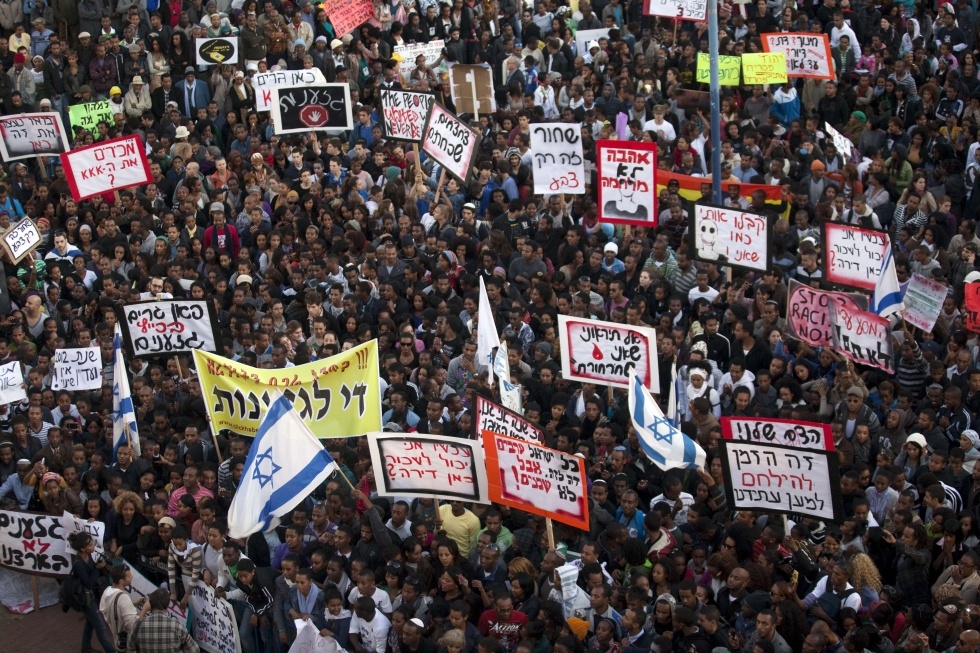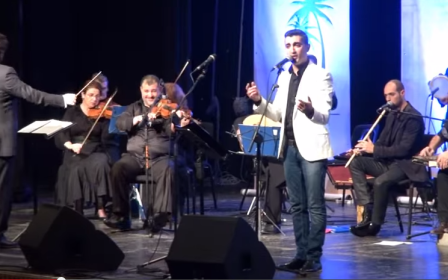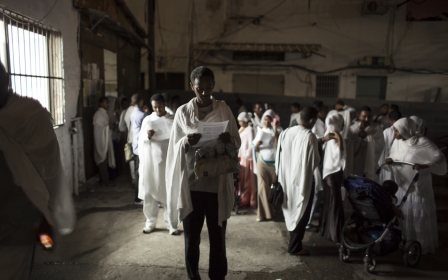Yemenite Israelis renew struggle to find children
Published date: Vendredi 13 février 2015 - 03:30
|
Last update: 9 années 9 mois ago
Third generation demand government come clean on events surrounding abduction of up to 5,000 children of early Arab-Jewish immigrants to Israel

At a recent family gathering I mentioned that I had begun to write about the abduction of children in the early years of Israel. It is estimated that between 1,000 to 5,000 children of Jewish immigrants from Yemen and other Arab countries were taken from their families and put up for adoption.
I had heard stories of Jewish children who disappeared, but I had rarely met anyone who could relate personal experiences from their own families regarding the kidnappings. So I certainly was not expecting the reaction that I received.
My aunts and uncles all responded at once: “You need to hear what happened with your uncle Daniel!” Daniel was amused, knowing what I was about to hear from his older sisters.
It must have been 1950. Daniel was about four years old when he became sick and was taken to hospital. Parents at that time were not allowed to stay there with their children overnight, so my grandparents came to see him again the next morning. The nurses told them that he had died.
My grandfather, a practising Jew from Algeria, asked for the body. He wanted to give his son a proper burial. The staff told him that they had already buried him. “You should go home,” he was told. “You have many children, go and take care of them.”
Nevertheless, he demanded to see the body and was not prepared to leave. Eventually, someone from the hospital staff went somewhere and came back with Daniel alive and well.
I was shocked that I had never heard this story. However, I shouldn’t have been surprised when the uncles added: “By the way, how do we know that they gave back the right kid?” Humour was an option because this incident had a happy ending thanks to my grandfather’s active disobedience.
The official narrative
The official story about the affair of the missing children is persuasive. It is about commitment and salvation. A small community of mostly European Jews took in a very large number of Jewish immigrants, mostly from Muslim countries. During this resettlement period in the early 1950s, there was chaos due to the hard conditions in the absorption camps.
As a result, babies became sick and died. State authorities claimed that if babies had been lost it was due to the confusion of immigration and resettlement. Some babies may have been misplaced by mistake, but for the most part the medical and welfare staff was honest and dedicated. The official story puts the blame on the victims, and portrays the parents as having been neglectful.
The authorities claimed that some parents did not claim their children at the hospital and that others kept silent about their “dead” babies for many years, so why did they complain years later? Their silence is conveniently understood as acceptance. But chaos cannot explain everything. It cannot explain the crimes or the cover-up.
Third generation seeks an end to silence
Although the affair of the "missing" children has been silenced, every few years the silence is disrupted, as it is today in the form of consciousness-raising events. Previously, after protests and numerous complaints to the police, the state conducted inquiries in 1967 and in 1988. The inquiries did not look at the large picture but investigated some individual complaints.
It is still not clear how many children were kidnapped and put up for adoption. It is not known how many of the children did in fact die. It is not clear if money was involved or to what extent the authorities were involved. It is believed that most of the babies were adopted by Jewish Ashkenazi (from Europe or North America) families. Those families were told that the babies had been neglected by their parents.
In 1995, a public investigative commission with power of subpoena was established. Some of the testimonies were given by people who worked in the health and welfare services. Half of those who were asked to testify did not show up, and the power of subpoena was not enforced. Some testimonies were given behind closed doors and have yet to be made public. The courts chose to seal these testimonies in its archives until 2066.
In the beginning, there were families who believed what they were told - that their children had died - although no bodies were returned and no graves were shown. Ultimately, the grief and shame led to silence - the parents' shame coming from the thought that they might have done more to protect their children. But the third generation is breaking the silence once again.
Amram, the organisation for Eastern identity and culture, conducted a series of awareness-building events in October 2014 in honour of Rabbi Meshulam. Meshulam was a Yemenite Jew who did not keep silent.
In the 1990s, Meshulam fought to bring the truth out in the open and demanded, with his followers, that the Israeli government investigate the affair. The media demonized him. He was portrayed as a lunatic. Most of the coverage of his protests had nothing to do with the affair itself. Finally the government silenced him with a jail sentence. Even so, soon afterwards, in 1995, the public investigative commission that he fought for was established.
Bottom-up activities
I attended the second in a series of awareness-building events on this subject in Tel Aviv. The setting was family-like. Rafi Shubeli, a long-time researcher of the affair and an activist, was one of the speakers. He analysed the history of the Yemenite struggle in Israel. I asked why the authorities took mostly Yemenite babies. People of Yemenite descent in the audience explained that their parents and grandparents were naive, that they believed in the “good Jewish doctors and nurses” and that “they didn’t know the language and were powerless".
Shubeli has a different explanation. Historically, he says, there were people who went to the police and there were others who broke into hospitals and tried to find their babies. Yemenites were not as naive as the official myth tries to portray them. He opposes the mainstream explanations that portray the parents as primitive people who didn’t want to take care of their babies. It is a classic story of racism and power. Anything else can be seen as blaming the victims.
People in the audience began raising their hands. One after another they got up and spoke: “I have a brother who is probably out there. My mother never stopped telling us about him … ” Another woman said: “ ... My aunt’s baby was taken from her and she never recovered.”
A third woman spoke up: “My parents came over from Yemen in 1950. We should not be silent anymore ... people need to know what happened ... it is painful.” She continued: “My mother was ashamed that her child was taken from her. I persuaded her to give testimony at the public investigative commission, even though I didn’t have any faith in this committee. Still I wanted her testimony to be documented ...”
These stories will be added to a database that is being compiled in an archive that will be open to the public. It is a bottom-up process that will eventually change the public discourse.
The third generation does not want another public investigative commission. They do not want more small graves to be opened and examined. They do not demand DNA tests. All these things have been done and the families (justifiably) were not satisfied with the results.
They are creating an unofficial truth project. This is what needs to happen when there is little faith in the authorities - especially when those with the power to investigate have an interest in silence. On the surface, the political powers have changed through the years, but something fundamental has not yet changed, and state institutions are still choosing denial as a policy.
Where are the perpetrators?
I cannot imagine someone at a family meal mentioning that his or her father was a doctor who was involved with this affair, or maybe a judge who had heard horrible truths and buried them. In addition, there is an active process of silencing that includes inquiries that concealed more than they revealed along with the mysterious disappearance of archives.
In the case of the Palestinian Nakba - the displacement of Palestinians in 1948 - there are Jewish Israeli human rights organisations that made it their mission to expose the truth and work with Palestinians for recognition and reparations. There is no such process concerning the "missing children" affair. The only fight for the truth is from small organisations of Yemenite and Eastern Jews. The sons and daughters of the perpetrators in this case have not crossed the lines, at least not yet.
The ethos concerning the Palestinians is easier for Israelis to explain. They were the enemy and the “other". Most Israeli-Jews do not refer to what is being done to Palestinians in terms of racism or colonialism. However, the subject of crimes based on racism against Jews is taboo.
It is possible that the state has chosen denial because the truth is detrimental to the official narrative depicting Israelis as moral and enlightened. The truth in this case could tear the nation apart. In her book, "Israeli Media and the Framing of Internal Conflict: The Yemenite Babies Affair", published in 2009, Madmoni-Gerber stresses that in regards to the "Affair", the Zionist notion was of rescue and unity.
The notion of rescue can be seen in testimonies throughout the book: “Maybe we did them [the parents] a favour, some of them were not rushing to get their babies back …” (a camp nurse); or “… If they refuse to give up their children they must be taken away from them forcefully” - the national supervisor of absorption camp baby houses).
The notion of unity is described in the following paragraph, which analyses the Israeli mainstream media: “… Experiences of Yemenite parents were viewed as exaggerated tales that emanated from disorganization and cultural misunderstanding. Or worse, Yemenite parents were seen as traitors working against the truth” (Madmoni-Gerber, p133).
The testimonies that are being collected are our hope. The third generation is angry enough and sceptical enough, and they are the last ones likely to have any personal memory of the first generation. They will not keep silent. They demand recognition, the rewriting of textbooks and reparations.
Thanks to Naama Katiee from the Amram organization for helping me understand.
-Michal Zak is a political educator, an expert in Jewish-Palestinian dialogue and a resident of the Palestinian-Jewish community of Wahat al Salam-Neve Shalom in Israel.
The views expressed in this article belong to the author and do not necessarily reflect the editorial policy of Middle East Eye.
Photo credit: The issue os racism is still an issue in Israel. Thousands of Israeli Jews of Ethiopian origin protest in the southern Israeli town of Kiryat Malachi against discrimination on January 10, 2012. Thousands of demonstrators marched through the town carrying signs with slogans like "Stop racism", "We are all equal", "Stop discrimination”, as the Ethiopian residents of the town claim that the building committee refuses to sell or rent apartments to them ( AFP )
Middle East Eye propose une couverture et une analyse indépendantes et incomparables du Moyen-Orient, de l’Afrique du Nord et d’autres régions du monde. Pour en savoir plus sur la reprise de ce contenu et les frais qui s’appliquent, veuillez remplir ce formulaire [en anglais]. Pour en savoir plus sur MEE, cliquez ici [en anglais].




